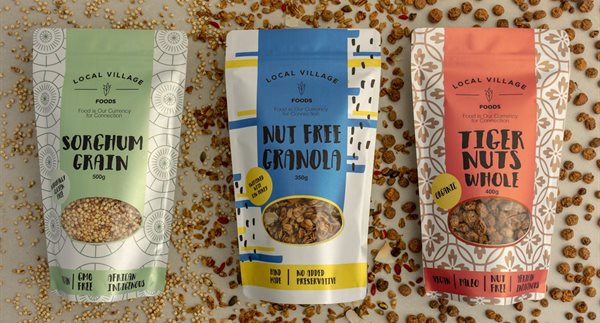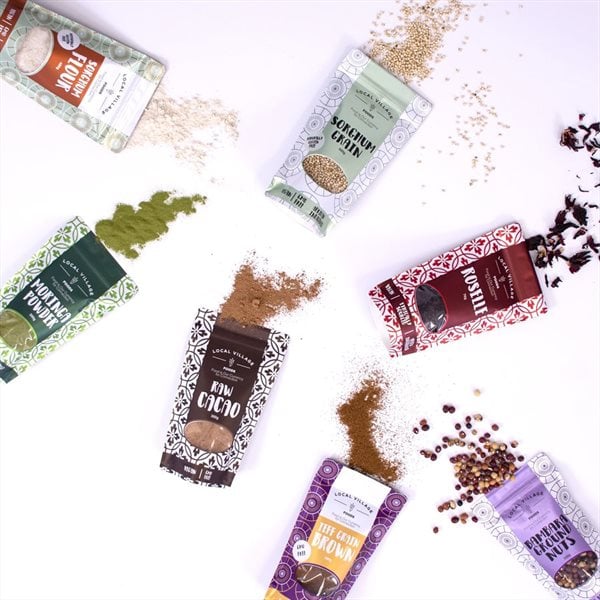
Through her startup, Local Village Foods, Manqele hopes to popularise the flavours of the continent by making products like African ancient grains, legumes and superfoods accessible and commonplace.
“African food is not represented in the global banquet,” Manqele said at the Food Next.Africa conference in Cape Town last week. “We may eat it once a year on Heritage Day, but it hardly features in our day-to-day diet.”
Local Village Foods, based in Gauteng, sources, processes and packages food grown on the continent to sell to the hospitality industry and in retail via food markets and health shops. No less than 90% of the brand’s ingredients are sourced from small-scale producers across Africa - from Limpopo and KwaZulu-Natal to Nigeria, Malawi and Benin.
The company's product range is a mix of indigenous ingredients along with others – like cassava and moringa – that aren’t native to Africa, but have since naturalised to the environment and grow particularly well in specific areas on the continent.

In addition to offering more familiar products like granola, raw cacao and African raw honey, Local Village Foods also sources the bambara groundnut, a grain legume originating in West Africa; and tiger nuts, a tuber that’s indigenous to Egypt but is now grown in a number of other African countries.
Then there’s teff, a fine grain that’s naturally gluten-free and has been identified by WWF as one of the top 50 future foods. Ground into a flour, it’s used for making the traditional Ethiopian bread injera, but its baking applications extend far beyond just bread.
Roselle, meanwhile, is a species of Hibiscus that’s native to West Africa but is now cultivated successfully in southern African. Considered a superfood, it has multiple food applications especially in the creation of beverages and desserts.
Manqele founded Local Village Foods with a vision to create a network of African agripreneurs supplying equitably-sourced and sustainably-grown African ingredients.
She was born in Lusikisiki, a small, poverty-stricken town in the Eastern Cape with a high unemployment rate. Manqele described her frustration growing up there because her village seemingly had everything it needed to be prosperous - “an amazing climate, good resources, land and people,” she said.
Driven to positively impact these circumstances, she went to university to study a Social Science degree majoring in Community Development and Entrepreneurship. “I wanted to understand if perhaps entrepreneurship could be a vehicle for sustainable rural development in my community and others like it,” Manqele explained.
After leaving her first official full-time job at an asset management company, she explored the food industry, familiar with the concept as she had grown up in an area where income was derived mainly from agricultural products.

She eventually launched Local Village Foods with the belief that fair and sustainable food businesses hold potential solutions to many of Africa's interconnected challenges.
The 28-year-old entrepreneur made the Mail and Guardian list of South Africa’s Top 200 Young People to Watch in 2019, with the report noting that Local Village Foods has proven itself to be a viable and valuable startup, providing employment and community growth.
During her keynote, the agripreneur laid out some of the challenges her startup identified and hopes to help address, including: food insecurity, rural villages not participating in the economy, people in those villages not actively seeking jobs, climate change leading to drought which negatively impacts agriculture, and a lack of consciousness relating to health and diet, particularly in poorer communities.
Manqele added that challenges also deliver opportunities. She believes that Africa has the potential to feed the globe considering that the sub-Saharan Africa population is projected to double by 2050, the continent boasts land equating to three times the size of Europe, and consumer spending in Africa alone is projected to reach $2.1 trillion by 2025.
The founder and CEO also hopes to play a role in the implementation of free and fair trade across the continent. “We've signed the African Continental Free Trade Area agreement, to be implemented next year. It won't be an easy journey but it's something worth rolling up our sleeves for,” she said.
Positioned as a Pan-African food company, Manqele’s immediate plans for Local Village Foods are to scale up the business and take it to bigger retailers in South Africa and beyond the borders.
Manqele is deeply inspired by Africa, its diverse cultures and its quest for social and economic unity. She sees food as a way to connect with others in a nation and a global society that is divided.
“Our core focus as a business is not only to work with village communities and get as many people as possible to participate in the economy, but we also hope that food can be a vehicle to unite us. Maybe if we get to know each other’s cultures, and learn about umqombothi, about sorghum, about bambara, then we can connect as a community,” Manqele said.
